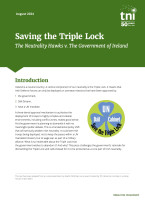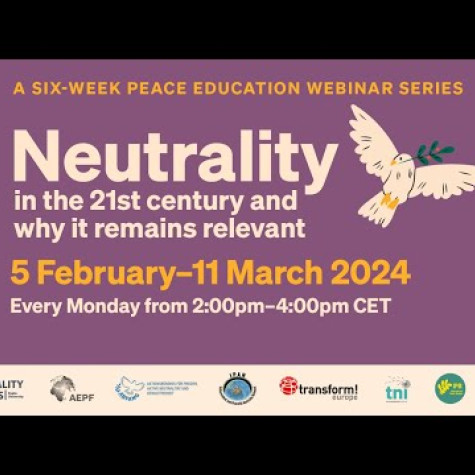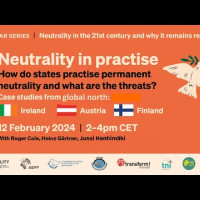Peace and Neutrality No to War
Topic category
Around the world war is causing large-scale death and destruction, forcing millions from their homes and exacerbating climate breakdown. Against this backdrop, the Transnational Institute is advancing an area of work dedicated to promoting peace through neutrality and the non-alignment of states with military alliances and powers. According to the United Nations, neutrality 'can contribute to the strengthening of international peace and security ... and can play an important role in developing peaceful, friendly and mutually beneficial relations between the countries of the world'. Neutrality is not about being passive, indifferent or inactive in the face of injustice. Rather, when states are neutral they actively oppose war and refuse to participate in divisive military alliances. This allows states to cultivate diplomatic ties while strengthening multilateralism. It also allows states to play an active, positive role in convening peace talks and mediating in conflict resolution. More neutral states means less states engaged in war.
Más reciente
-
Weaving the past, present and future of permanent neutrality : Neutrality Session 6
Fecha de publicación: -
The role of civil society in neutrality : Neutrality Session 5
Fecha de publicación:
Presentado
-
What is neutrality? Neutrality Session 1
Fecha de publicación: -
Saving the Triple Lock The Neutrality Hawks v. The Government of Ireland
Fecha de publicación:
-
Case studies on permanent neutrality – how do states practise permanent neutrality and what are the threats? Neutrality Session 2
Fecha de publicación: -
What does it mean to be neutral in the 21st century? : Neutrality Session 4
Fecha de publicación:
Neutrality in the 21st Century and Why It Remains Relevant
In a time of global upheaval, with the resurgence of conflicts and a shifting geopolitical landscape, the concept of neutrality is once again at the forefront of international discourse. TNI co-hosted a webinar series led by the International Peace Bureau titled Neutrality in the 21st Century and Why It Remains Relevant.

